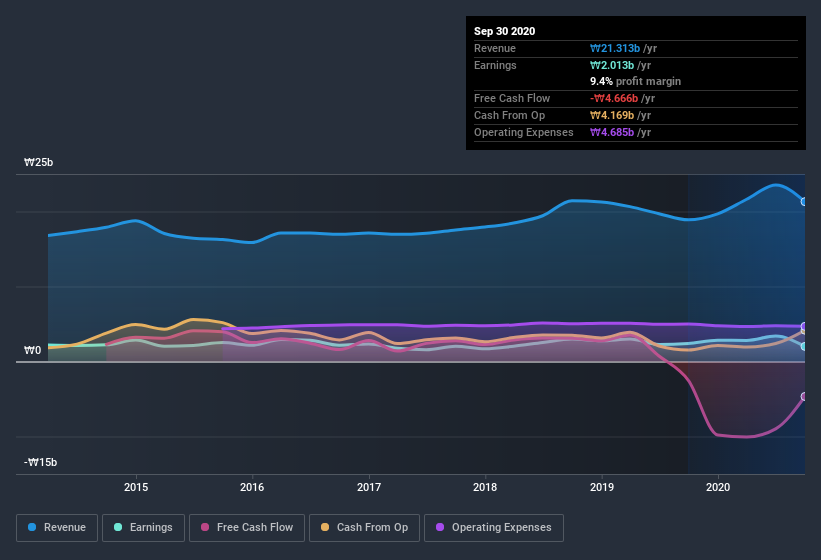- South Korea
- /
- Communications
- /
- KOSDAQ:A109080
Here's Why We Don't Think Opticis's (KOSDAQ:109080) Statutory Earnings Reflect Its Underlying Earnings Potential
Statistically speaking, it is less risky to invest in profitable companies than in unprofitable ones. However, sometimes companies receive a one-off boost (or reduction) to their profit, and it's not always clear whether statutory profits are a good guide, going forward. Today we'll focus on whether this year's statutory profits are a good guide to understanding Opticis (KOSDAQ:109080).
We like the fact that Opticis made a profit of ₩2.01b on its revenue of ₩21.3b, in the last year. The chart below shows that it has grown revenue over the last three years, while profit has remained roughly flat.
See our latest analysis for Opticis

Of course, it is only sensible to look beyond the statutory profits and question how well those numbers represent the sustainable earnings power of the business. So today we'll look at what Opticis' cashflow tells us about the quality of its earnings. Note: we always recommend investors check balance sheet strength. Click here to be taken to our balance sheet analysis of Opticis.
A Closer Look At Opticis' Earnings
As finance nerds would already know, the accrual ratio from cashflow is a key measure for assessing how well a company's free cash flow (FCF) matches its profit. To get the accrual ratio we first subtract FCF from profit for a period, and then divide that number by the average operating assets for the period. You could think of the accrual ratio from cashflow as the 'non-FCF profit ratio'.
That means a negative accrual ratio is a good thing, because it shows that the company is bringing in more free cash flow than its profit would suggest. While it's not a problem to have a positive accrual ratio, indicating a certain level of non-cash profits, a high accrual ratio is arguably a bad thing, because it indicates paper profits are not matched by cash flow. To quote a 2014 paper by Lewellen and Resutek, "firms with higher accruals tend to be less profitable in the future".
Opticis has an accrual ratio of 0.36 for the year to September 2020. Statistically speaking, that's a real negative for future earnings. And indeed, during the period the company didn't produce any free cash flow whatsoever. Even though it reported a profit of ₩2.01b, a look at free cash flow indicates it actually burnt through ₩4.7b in the last year. Coming off the back of negative free cash flow last year, we imagine some shareholders might wonder if its cash burn of ₩4.7b, this year, indicates high risk.
Our Take On Opticis' Profit Performance
As we discussed above, we think Opticis' earnings were not supported by free cash flow, which might concern some investors. For this reason, we think that Opticis' statutory profits may be a bad guide to its underlying earnings power, and might give investors an overly positive impression of the company. Sadly, its EPS was down over the last twelve months. At the end of the day, it's essential to consider more than just the factors above, if you want to understand the company properly. If you want to do dive deeper into Opticis, you'd also look into what risks it is currently facing. For example, we've found that Opticis has 2 warning signs (1 is a bit concerning!) that deserve your attention before going any further with your analysis.
This note has only looked at a single factor that sheds light on the nature of Opticis' profit. But there is always more to discover if you are capable of focussing your mind on minutiae. Some people consider a high return on equity to be a good sign of a quality business. While it might take a little research on your behalf, you may find this free collection of companies boasting high return on equity, or this list of stocks that insiders are buying to be useful.
If you decide to trade Opticis, use the lowest-cost* platform that is rated #1 Overall by Barron’s, Interactive Brokers. Trade stocks, options, futures, forex, bonds and funds on 135 markets, all from a single integrated account. Promoted
New: AI Stock Screener & Alerts
Our new AI Stock Screener scans the market every day to uncover opportunities.
• Dividend Powerhouses (3%+ Yield)
• Undervalued Small Caps with Insider Buying
• High growth Tech and AI Companies
Or build your own from over 50 metrics.
This article by Simply Wall St is general in nature. It does not constitute a recommendation to buy or sell any stock, and does not take account of your objectives, or your financial situation. We aim to bring you long-term focused analysis driven by fundamental data. Note that our analysis may not factor in the latest price-sensitive company announcements or qualitative material. Simply Wall St has no position in any stocks mentioned.
*Interactive Brokers Rated Lowest Cost Broker by StockBrokers.com Annual Online Review 2020
Have feedback on this article? Concerned about the content? Get in touch with us directly. Alternatively, email editorial-team (at) simplywallst.com.
About KOSDAQ:A109080
Opticis
Engages in the design, manufacture, and sale of fiber- optic digital link products in South Korea and internationally.
Flawless balance sheet with solid track record.
Market Insights
Community Narratives



